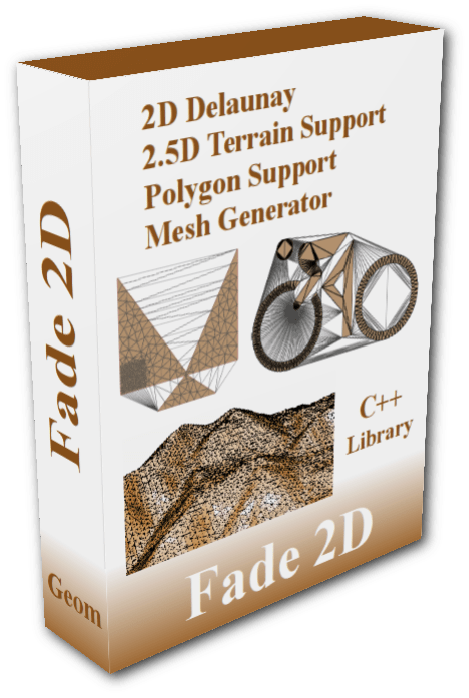You can use Fade2D/2.5D under two licenses:
- The free student license is already included in the download. Use it for non-commercial scientific research.
- In addition a commercial license exists for professional users. The Fade library has been designed for an industrial environment and it is fast enough to triangulate millions of points. Moreover Fade is numerically robust, it is actively maintained and you will receive personal support.

Student license
Fade is not free software. But the student license is free of charge for non-commercial scientific research and you can use it without registration. If you use Fade in your software:
- Please put a link to Fade on your research or project homepage. Also, it would be nice if you could write a few words there about Fade and how your research benefits from the project.
- Describe and cite Fade in scientific publications for which you have used it.
- Your licensing should make clear that others are not allowed to use your software with the student license of Fade commercially.
Testing
It is common and permissible to use the included student license even in commercial development for a few weeks for the initial tests. But if you are developing with Fade for a longer period of time, please contact us.
Commercial license
All other applications, including commercial in-house usage, require a commercial license which has the advantage of
- maintenance
- immediate error corrections and
- personal programming support.


“Please contact us for a commercial license. Describe your software project briefly and tell us which of the below Fade components you would like to use.”
Do not hesitate to ask for support with your code when you test the library.
License components
The commercial license of Fade consists of the following parts:
- The Fade2D base component (mandatory): It covers 2D Delaunay triangulations, constraint edges, zones and the Segment Checker. Triangulations and zones can be saved and reloaded.
- The Fade2.5D module (optional): The 2.5D version is ideal for 2.5D point clouds i.e., for terrains and other height fields. Points have (x,y,z)-coordinates and there is a bunch of additional algorithms: For instance point cloud reduction, ISO line computation, height queries like z=getHeight(x,y), smoothing, valley/ridge edge-flips to adapt a triangulation to a terrain, the Cookie Cutter, draping line segments onto a surface and 2.5D segment intersection checking. Further you can import and post-process pre-existing triangles.
- The Quality Mesh Generator (optional): Delaunay Meshing and Grid Meshing refines meshes to achieve well shaped triangles, see also Advanced Mesh Generation
- The Cut&Fill software for earthwork volume calculations (optional): Cut-And-Fill computes the volume between two overlapping triangulations (TIN’s).
- The Voronoi module (optional): Given n input points (sites) the Voronoi diagram divides the xy-plane into n regions (cells) such that there is exactly one region around each site and the distance from any point of a region to the site of this region is smaller than the distance to any other site.